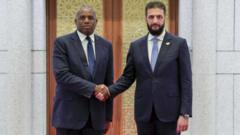Is David Lammy the First UK Minister to Break Ground in Syria Since 2011?

Understanding David Lammy's Historic Visit to Syria: Implications and Insights
In a groundbreaking move, Foreign Secretary David Lammy has become the first UK minister to visit Syria since the onset of the civil war 14 years ago. This visit comes at a pivotal moment as Syria grapples with the aftermath of a regime collapse and the establishment of a new Islamic-led government. Lammy’s meetings, particularly with interim president Ahmad al-Sharaa, underscore the UK's approach to fostering inclusivity and accountability in a country that has seen years of conflict and upheaval. This article delves into the details of Lammy's visit, the current political landscape in Syria, and the implications for both the nation and the international community.
The Context of Lammy's Visit
Syria has been embroiled in a civil war since 2011, marked by horrific violence and humanitarian crises. The recent collapse of the Assad regime, which had ruled for 54 years, has opened a new chapter in the country's tumultuous history. Lammy's meeting with al-Sharaa comes just eight months after this significant political shift, signaling a potential thaw in relations between the UK and Syria.
The UK government has announced a substantial support package of £94.5 million aimed at humanitarian aid and facilitating long-term recovery efforts within Syria and neighboring countries that host Syrian refugees. This financial commitment reflects a broader strategy by Western nations to engage with the new government while continuing to advocate for human rights and democratic governance.
Meeting with the Syrian Interim Government
During his meeting with Ahmad al-Sharaa, Lammy emphasized the need for the new government to embrace inclusivity and transparency. He highlighted the importance of governing in a manner that reflects the diverse makeup of Syrian society, which includes various ethnic and religious groups. Lammy stated:
"I'm here to speak to this new government, to urge them to continue to be inclusive, to ensure that there's transparency and accountability in the way that they govern."
This statement encapsulates the UK's strategic approach: while engaging with the new leadership, it seeks to promote values that can help steer Syria towards stability and peace.
The Fragile Situation in Syria
Despite the hopeful rhetoric, the reality on the ground remains precarious. The new Islamic-led government is facing immense challenges, including violence against minority groups and the risk of slipping back into authoritarian governance. Recent reports indicate alarming incidents, such as attacks against the Alawite minority and violent actions against the Druze community, raising questions about the government's capacity to protect all citizens.
In Syria, these concerns are compounded by a history of terrorism and conflict. Lammy acknowledged this complex backdrop, stating that the UK is focused on future engagement rather than dwelling on the bloody past. However, critics argue that the presence of former members of Hayat Tahrir al-Sham in the government presents a significant risk to the stability and safety of the nation.
International Reactions and Relations
The international community is watching closely as the new government establishes its authority. In recent months, several Western officials have visited Syria, indicating a potential shift in diplomatic relations. The lifting of sanctions by the UK and the US reflects a willingness to engage with the new leadership, provided they demonstrate a commitment to democratic values and human rights.
Lammy's visit aligns with a broader trend of international dialogue aimed at addressing the humanitarian crisis while pushing for accountability. He noted the UK’s support for the Organisation of the Prohibition of Chemical Weapons (OPCW) to dismantle Assad's chemical arsenal, emphasizing the importance of international oversight in ensuring the safety and security of the region.
Concerns Over Governance and Human Rights
As the new government consolidates power, concerns about governance arise. Many fear the establishment of a new dictatorship characterized by a lack of civil liberties. Observers note that there is minimal representation of women in the government, with only one female minister appointed. This raises questions about the inclusivity of governance and the potential marginalization of various societal groups.
Furthermore, reports suggest that many appointments within the new government are based more on connections than qualifications, with individuals advocating for a radical Islamic agenda. Lammy has expressed the UK’s desire for Syria to move towards a peaceful and prosperous future, but this vision requires active international engagement.
Challenges Ahead: Internal and External Threats
The challenges facing Syria are not limited to internal governance issues. The region remains volatile, with Israel conducting airstrikes and holding territory within Syrian borders. Lammy urged the Israeli government to reconsider its actions, emphasizing the need for stability in the region.
Additionally, the presence of foreign fighters and their families in detention camps poses a significant threat. The UK has been hesitant to repatriate these individuals, complicating the situation within Syria. Lammy’s discussions with the interim president included counterterrorism strategies and managing irregular migration, reflecting the complexity of the current landscape.
The Road to Recovery: A Path Forward for Syria
While the future of Syria remains uncertain, international support may play a crucial role in facilitating recovery. The UK’s financial aid package aims to bolster humanitarian efforts and support the rebuilding of a country devastated by war. Engaging with the new government to promote inclusivity and accountability is essential for ensuring that recovery efforts reach all segments of society.
Despite the myriad challenges, Lammy’s visit symbolizes a cautious optimism for Syria’s future. As the international community navigates this complex landscape, the focus should remain on promoting a governance model that respects the rights of all citizens, fosters stability, and encourages democratic principles.
Conclusion
The visit of Foreign Secretary David Lammy to Syria marks a significant moment in UK-Syrian relations. It reflects a broader trend of international engagement aimed at addressing the humanitarian crisis and promoting democratic values within a fragile political landscape. As Syria stands on the brink of a new era, the commitment to inclusivity, accountability, and human rights will be crucial in shaping the future of the nation.
As the world watches this unfolding situation, one must ponder the implications of foreign involvement in rebuilding a war-torn nation. Will the new government uphold the values of inclusivity and transparency, or will it succumb to authoritarianism? The journey ahead is fraught with challenges, but with concerted international efforts, there is hope for a brighter future for Syria.
FAQs
What prompted David Lammy’s visit to Syria?
David Lammy visited Syria to engage with the new Islamic-led government, promote inclusivity, transparency, and accountability, and announce a significant humanitarian aid package from the UK government.
What are the main concerns regarding the new Syrian government?
Concerns include potential authoritarianism, violence against minority groups, lack of women's representation, and appointments based on connections rather than qualifications.
How is the international community responding to the situation in Syria?
The international community is cautiously engaging with the new government while advocating for human rights and stability, with several Western officials visiting Syria and sanctions being lifted.
What challenges does Syria face moving forward?
Syria faces internal challenges like governance issues and violence against minorities, as well as external threats, including Israeli military actions and the presence of foreign fighters.
As the situation in Syria evolves, what role do you think the international community should play in supporting the country's recovery? #Syria #InternationalRelations #HumanRights
Published: 2025-07-05 21:34:07 | Category: technology



